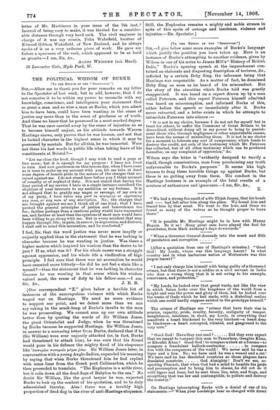THE POLITICAL WISDOM OF BURKE.
[TO THE EDITOR Or THE "SPECTATOR.'
SIR,—Allow me to thank you for your remarks on my letter to the Spectator of last week, but to add, however, that I do not conceive it to be within my power to reconcile with my
knowledge, conscience, and intelligence your statement that so great a man and so wise a man as Burke, which you admit him to have been, could have been wanting in the sense of justice any more than in the sense of goodness or of truth. And these we know that he possessed in a most marked degree.
That he was once carried away by the sense of injustice so as to become himself unjust, as his attitude towards Warren Hastings shows, only proves that he was human, and not that he lacked character in the highest sense in which it may be possessed by mortals. But for all this, he was immortal. Were not these his last words in public life when taking leave of his constituents at Bristol ?—
" Let me close the book, though I may wish to read a page or two more ; but it is enough for my purpose : I have not lived in vain. And now gentlemen on this serious day, when I have come as it were to make up my account with you, let me take at least some degree of honest pride in the nature of the charges that are raised against me. I do not stand here before you I think accused of venality or of neglect of duty. It is not stated that during the long period of my service I have in a single instance sacrificed the slightest of your interests to my ambition or my fortune. It is not alleged that to gratify any anger or revenge, of my own or of my party, I have taken any part in wronging or oppressing any man, or any men of any description. No; the charges that are brought against me are I think all of one kind; that I have pushed the general principles of justice and benevolence too far ; farther perhaps than a cautious policy would have warranted me, and farther at least than the opinions of most men would have been willing to go along with me. But in every accident that may happen through life ; in pain, in sorrow, in depression, and distress, I shall call to mind this accusation, and be comforted."
I feel, Sir, that the word justice was never more inaptly or unjustly applied than in the statement that he was lacking in character because he was wanting in justice. Was there a higher motive which inspired his wisdom than the desire to be just ? If so, what was it? For his whole career was a struggle against oppression, and his whole life a vindication of high principle. I feel sure that there was no accusation he would have resented more bitterly—for did be not feel a stain like a wound ?—than the statement that he was lacking in character because he was wanting in that sense which his wisdom valued most, the sense of duty to his fellow-men.—I am, [Our correspondent "Z." gives below a terrible list of instances of the unscrupulous violence with which Burke waged war on Hastings. We need no more evidence to support our point, and we detest more than we can say raking in the muck-heap of Burke's insults to the man he was prosecuting. We cannot sum up our own attitude better than by quoting the words of Sir William Jones, the great Orientalist and Judge, when he was threatened by Burke because he supported Hastings. Sir William Jones, in answer to a menacing letter from Burke, declared that if he (Sir William) were ever unjustly attacked (as, in fact, Burke had threatened to attack him), he was sure that his friend would pour in his defence the mighty flood of his eloquence
like 'Acrtruplov wore/Lao layer poor. Sir William Jones later, in conversation with a young Anglo-Indian, expanded his meaning by saying that when Burke threatened him he had replied with some lines from the Greek poet Callimachus, which be then proceeded to translate. " The Euphrates is a noble river,
but it rolls down all the dead dogs of Babylon to the sea." No doubt Sir William, like the good lawyer be was, expected Burke to look up the context of his quotation, and to be duly admonished thereby. Alas I there was a terribly high proportion of dead dog in the river of anti-Hastings eloquence.
Still, the Euphrates remains a mighty and noble stream in spite of this spate of outrage and insolence, violence and injustice.—En. Spectator.]










































 Previous page
Previous page